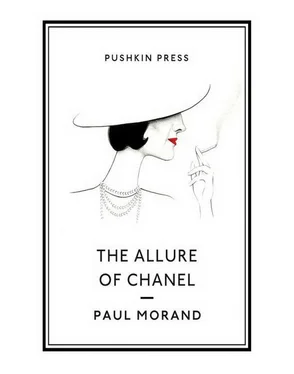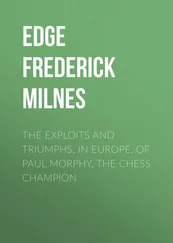Expensive jewellery does not improve the woman who wears it any more than costly fabrics woven with precious materials do; if she looks plain, she will remain so. The point of jewellery is to pay respect to those for whom, and at whose homes, one wears it. I readily wear a lot of jewellery because, on me, it always looks artificial. The mania to want to dazzle disgusts me; jewellery is not meant to arouse envy; still less astonishment. It should remain an ornament and an amusement. Jewellery should be looked upon innocently, naively, rather as one enjoys the sight of an apple tree in blossom by the side of the road, as one speeds by in a motor car. This is how ordinary people perceive it; for them jewellery denotes social standing. A queen without a tiara is not a queen. In the spring of 1936, a revolution took place in Paris, and at my shop too, in the rue Cambon. I decided to go and talk to the rebels: “Mademoiselle should remove her jewellery!” Angèle said to me, very alarmed. “Go and fetch my pearls,” I replied, “I won’t go up to the workshops until I have them round my neck.” For I was determined to respect the women who worked for me.
I BEGAN WITH HALF A DOZEN WOMEN working for me. I have had as many as three thousand five hundred.
In 1936, like everywhere else, we had a sit-down strike. (Whoever dreamt it up was a genius.) It was cheerful and delightful. The accordion could be heard playing all over the house.
“What are your demands? Are you badly paid?”
“No.” (My staff are always better paid than anyone else’s, because I know what work is. Madame Lanvin even accused me of poaching her staff and wanted to take me to court.)
“What are you asking for?”
“We don’t see enough of Mademoiselle. Only the models see her.”
It was a strike for love, a strike of the yearning heart.
“I want to do something for you,” I then said to the staff. “I’m giving you my house.”
Grateful thanks from the CGT.10 Delegations from the trade unions. The new owners set off in search of funds, a working capital, promising to return soon; I’m still waiting for them.
At Mimizan, in the Landes, I organised a workers’ holiday camp. This experiment costs me millions, which I don’t regret. Buildings were constructed to house three or four hundred women. I paid for the travel expenses—second-class, so that they shouldn’t be offended—with one month’s paid holiday, instead of the legally entitled fortnight.
That lasted for three years. It was lovely, delightful and very jolly, for I didn’t want Mimizan to be like a prison.
After three years, the mayor asked me to close down, then he ordered me to do so. The motive: these lone women, he said, were taking away the region’s menfolk. The women from the Landes were not able to cope with the situation.
10 The Confédération générale du travail , the association of French trade unions. [Tr]
IN 192– I CAME TO KNOW Stravinsky. He was then living at the home of Pleyel, the older one, in the rue Rochechouart. He was still not very cosmopolitan, and he was very Russian in his ways, with the look of a clerk in a Chekhov short story. A small moustache beneath a large rat-like nose. He was young and shy; he found me attractive. Among this circle, the only man I felt attracted to was Picasso, but he was not available. Stravinsky pursued me.
“You’re married, Igor,” I told him, “when Catherine, your wife, gets to know …”
And he, very Russian:
“She knows I love you. To whom else, if not to her, could I confide something so important?”
Without being jealous, Misia began to spread gossip. She had sensed that something was happening without her knowing:
“What are you doing? Where are you going? People tell me that Igor walks your dog, explain yourself!”
“I could give a concert at the Salle Gaveau,” Stravinsky divulged to me one day, “but I can’t afford a sufficient guarantee.”
I replied that I would look after it. Ansermet was summoned. Everything was arranged.
“Now,” I said to Stravinsky, “you have to speak to Misia about it. Off you go.”
Stravinsky goes to see her.
The following day, a Sunday morning, I am setting off to walk around Longchamp.
Misia: “I am overcome with sorrow. When I think that Stravinsky has accepted money from you!”
I had already been through the same “when I think …” in connection with Diaghilev, but in this case Misia feared a catastrophe on quite another scale: that Stravinsky might divorce in order to marry me. Sert became involved. He went and took Igor to one side.
“Môssieu, M Capel has entrusted Madmachelle to me; a man like you, Môssieu, is known as a sh—.”
And Misia came back to me, stirring up the drama:
“Stravinsky is in the room next door. He wants to know whether or not you will marry him. He is wringing his hands.”
Having said this, the Serts, while cultivating the emotional anguish he was suffering, made fun of Stravinsky. Up until the day when I said to Ansermet:
“It’s ridiculous, the Serts are mad. Everyone is talking about this business. Picasso is saying things. I want Igor to come back and for us to be friends.”
Stravinsky came back. He came back every day and taught me about music; the little I know about it, I owe to him. He talked to me about Wagner, about Beethoven, his bugbear, about Russia. One day eventually:
“The Ballets [Russes] are leaving for Spain,” Stravinsky said to me. “Come with us.”
“I will go and find you.”
I am on my own in Paris. Grand-Duke Dimitri, whom I had not seen since 1914, arrives in Paris at this moment. We dined together. I saw him the following day. In a very friendly way, I say to him:
“I have just bought a little blue Rolls, let’s go to Monte Carlo.”
“I have no money, all I’ve got is fifteen thousand francs …”
“I’ll put in the same amount,” I replied to the Grand-Duke. “With thirty thousand, we’ll have enough to enjoy ourselves for a week.”
We set off.
Misia was watching. She immediately sent a telegram to Stravinsky, in Spain: “Coco is a midinette who prefers grand-dukes to artists.”
Stravinsky almost exploded. Diaghilev sent me a telegram: “Don’t come, he wants to kill you.”
This affair, which I laugh about today, changed Igor’s life entirely. It transformed him. From being shy and self-effacing, it made him, contrary to what would normally have happened, into a hard man with a monocle; from a victim into a conqueror. Like many musicians, Igor has become an excellent businessman, he has a very precise awareness of his rights as an artist and can defend his interests very well.
I fell out with Misia for weeks, following this treacherous telegram. She swore to me that she had sent no such thing. Once again, I forgave her. In any case, Misia turned the wheel of fate, she also turned its page; she intervened, and from that day forth Stravinsky and I never saw each other again.
HERE, I AM GOING TO VENT my anger against the age. Let those who are bored skip the pages. I know that I will sound like the Léon Bloy of couture, but too bad. I am, people frequently say, an anarchist.
I have employed society people, not to indulge my vanity, or to humiliate them (I would take other forms of revenge, supposing I were seeking them), but, as I have said, because they were useful to me and because they got around Paris, working on my behalf; as for me, I went to bed. Thanks to them, I was well-informed about everything, just as Marcel Proust, from the depths of his bed, knew what had been said at all the previous evenings’ dinner parties. I know what work is. I have never hired layabouts. Comte Etienne actually slaved away to such an extent that he secretly poached my buyers; he sent them off to his town house where he had set up a second workshop, while still retaining, what’s more, the one he had at my house. I dismissed him, for all who are paid deserve hardship. I don’t like dilettantes who take other people’s place, be it in literature or couture. It is immoral to play at earning one’s living.
Читать дальше












